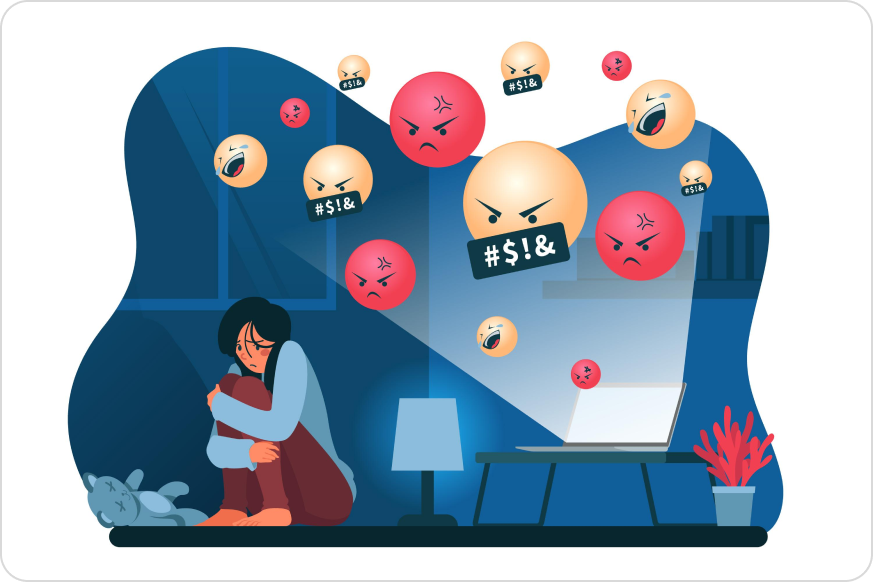As social media managers, we often face the tricky question: Should we delete comments that contain hate speech, disinformation, vulgarisms or other toxic content? This decision isn’t just a matter of clicking a button; it involves weighing the principles of free speech against the need for protecting your account. Let’s break down this dilemma.
Table of contents:
When managing social media pages, deciding whether to hide or delete hate comments is crucial. Hiding comments is softer–it makes them invisible to the public but still visible to the commenter and their friends, preventing public escalation while keeping the commenter unaware. Deleting comments, however, removes them entirely, sending a clear message that hate speech is not tolerated. From the admin’s perspective, hiding comments can manage backlash quietly and keep your engagement numbers higher, while deletion upholds a strong stance against hate, possibly provoking the commenter. Both strategies aim to maintain a respectful environment, but the choice depends on the desired level of visibility, engagement and, last but not least, confrontation management.
Yes! In a good way! 🤩
Let’s look at some numbers. We analyzed the engagement metrics of an account moderated by elv.ai’s tool over the span of 4 months. Believe it or not, engagement increased!
As you can see in the graph above, the number of toxic comments decreased with moderation while the number of positive comments increased. Why?
It’s simple: Users like to feel safe. Content moderation ultimately means protecting your audience from toxicity and fostering a healthier and more respectful environment for them to interact with one another. If they don’t see toxic comments, they’re less afraid of backlash and more likely to share their opinion in a polite way.
Yes, removing comments can raise eyebrows about censorship. Free speech is a cornerstone of online interactions, but here’s the catch: when free speech turns into hate speech, it threatens the safety and inclusivity of our digital spaces. By deleting hate speech, we’re not censoring; we’re actively working to create a platform where everyone feels safe to engage.

Here’s where things get tricky. Deciding what counts as toxic can be subjective. To mitigate this, consistency is key. Let’s consider our brand values. Most brands stand for respect, inclusivity, and positivity. Allowing toxic content can tarnish these values. Having clear, well-defined community guidelines helps everyone understand what’s acceptable and what’s not.
But, how do we handle the grey areas? It’s important to be in sync with the rest of your marketing team. If all of you know what set of guidelines you’re working with, navigating your discussions is easy. Try brainstorming together: Which comments cannot be allowed? Which ones should we reply to? Which questions should be redirected to customer support? Content moderation is not just about removing comments; it’s about consistently standing up for what our brand represents.
Allowing hate speech and misinformation to spread unchallenged can have real-world consequences. For example, a study by the University of Warwick found that anti-refugee sentiment on Facebook significantly increased real-world hate crimes against refugees in Germany. For every four anti-refugee posts, there was one corresponding hate crime. This correlation was particularly strong in areas with higher Facebook usage, showing the powerful influence of social media on real-world actions. It’s not just about protecting our brand’s image; it’s about doing what’s right.

So, what’s the verdict? While we must tread carefully to balance free speech with content moderation, the scales often tip towards action. Deleting or hiding hate speech and toxic content is not just about cleaning up our comments section; it’s about taking a stand for a healthier, more respectful online community.
This is where elv.ai comes in…
Do you think content moderation is the answer for you? We can offer you even more. With elv.ai, you’ll no longer have to worry about negative comments flooding your brand’s discussions. Unlock healthier discussions with our effective combo of 24/7 AI moderation and human content moderators. ✨ It’s not just profanities and misinformation that we protect your followers from. Our AI is smart enough to learn brand-specific terms. So save your tears for another day, for we’re saving your brand’s image!
🔎Learn more about our content moderation rules🔍
We’re all navigating these choices, trying to find the best path forward for our communities and our brands. Is your brand facing toxic comments on its social media profiles? Try out our tool for free!






We fight against hoaxes and misinformation to protect brands on their social networks.